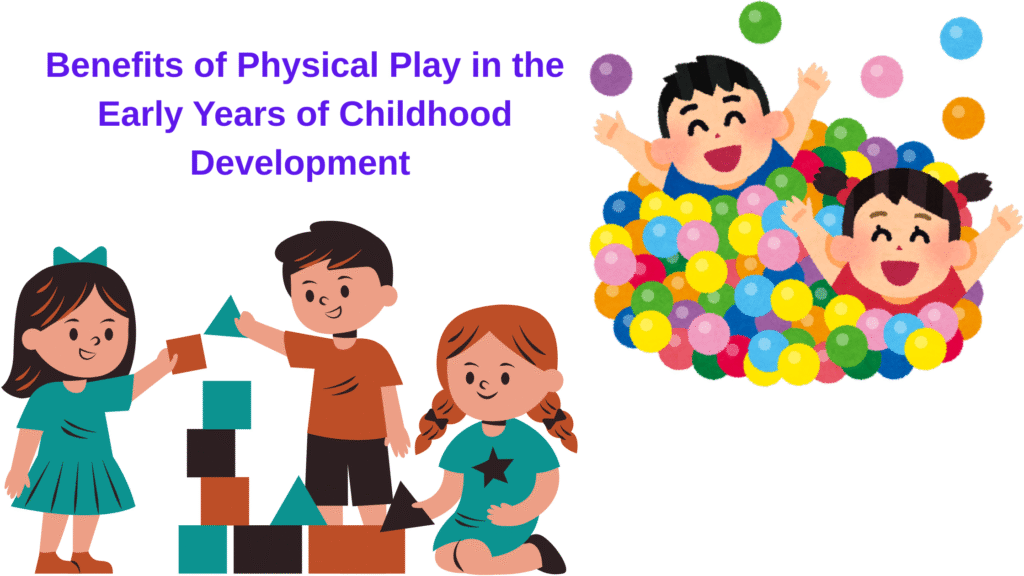The benefits of physical play in the early years of childhood development go beyond just providing fun for your kids. Your child is more likely to grow socially, emotionally, and cognitively when they are introduced to play-based learning. But what is physical play and why is it important for a child’s overall development? Read this blog to learn more.
What is Physical Play?
Physical play is all about moving the body. In the early years, physical play is anything that gets kids moving and using their energy. This could mean climbing a jungle gym, hopping through an obstacle course, or simply skipping around. It includes all the activities that help build their gross motor skills and overall coordination.
But when we talk about movement, it isn’t just about running and jumping. It also includes smaller, more controlled actions that strengthen specific muscle groups. Think of your child carefully painting a picture or using their fingers to bring a glove puppet to life. Both instances require them to fine-tune their motor skills. Through physical play and gross motor skills activities, their growing bodies get a mix of both to build strength, balance, and control.
7 Benefits of Physical Play in the Early Years of Your Child’s Development
Physical play activities are more than just a source of fun for kids. These activities are necessary for their growth. Below are some of the benefits:
- Supports Physical Growth
Physical play helps in a child’s physical development. These activities help them develop their gross motor skills, promote overall physical fitness, strengthen bones and muscles, and improve balance and coordination.
- Helps with Mental Growth
With the help of physical play activities, kids not only grow physically but also mentally. They can develop their cognitive skills and enhance their problem-solving skills, critical thinking, and memory.
- Develops Emotionally
Whether it’s fear, anger, joy, or excitement, with the help of physical activities, your child learns how to express their emotions healthily which is a vital life skill. After expressing their emotions, they learn emotional regulation and resilience.
- Builds Interpersonal Skills
When your child plays outside, they are interacting with other kids their age. This helps them develop their social skills as they learn how to collaborate, communicate, share, and form emotional bonds with other people.
- Gets Freedom to Explore
Another benefit of play-based learning in the early years of your child’s development is that they learn to take control of their actions, solve problems on their own, and make decisions. When they get the freedom to do things on their own, they gain self-confidence, build independence, and boost their self-esteem.
- Builds Creativity
Unstructured physical play activities help kids to tap into their imagination and be creative. Your child can create their own world and characters, and make up their own stories. This way they can express themselves and explore new ideas.
- Absorbs Information
Play-based learning helps kids to absorb information better. This is because kids are naturally more interested in physical play activities, and when learning is introduced in this way, they are bound to pay more attention to what is being taught to them. Hence, they better absorb information.
Physical Play Activities for Kids Based on Their Age
Kids thrive when they are active! Physical movement plays a huge role in their development, especially when it comes to building strong gross motor skills. If you are looking for fun and engaging ways to support their growth, check out these exciting gross motor skills activities designed based on their age groups to boost their coordination, strength, and overall development:
- Infants (0 – 12 months)
- Balloon and bubble play
- Soft tunnels for crawling
- Reaching for hanging toys
- Toddlers (1 – 3 years)
- Homemade obstacle course
- Building with large blocks
- Preschoolers (3 – 5 years)
Conclusion
Physical play is necessary and an important part of your child’s early childhood development, the benefits of physical play in the early years of life cannot be overstated. Not only do these activities give them joy but also are necessary for their development and overall bodily growth along with improvement in mental development.
Your child is more likely to grow physically, emotionally, and socially better than kids who skip physical play in the early years. You can even see your child becoming more independent in terms of making decisions and finding their self-esteem boosted. We hope these benefits and a list of activities get you motivated to send your child outside to have some much-needed fun!
Author Bio: Chitra Khanna is the Content Strategist at KLAY Preschools & Daycare. With a background in digital marketing and a passion for empowering families, Chitra develops resources that engage and inform parents. Her creative approach and deep understanding of educational trends helps parents navigate the critical stages of their children’s development. Chitra enjoys exploring new learning methodologies and contributing to discussions on child welfare and growth.

